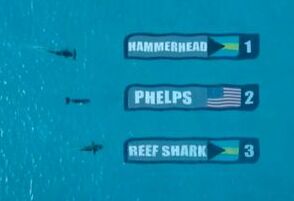菲尔普斯VS大白鲨,仅以两秒之差落败
|
With 23 Olympic gold medals, swimmer Michael Phelps needed a new challenge. And what better challenger for the most decorated Olympian in history than the ocean's most fearsome predator - the Great White Shark. The king of the pool threw down the gauntlet to the king of the ocean for a new documentary. But did he bite off more than he could chew?
Phelps vs Shark saw the American swimmer don a ‘monofin’ take to the open waves off Cape Town, South Africa for Shark Week. Backed by a 15-strong army of divers underneath him for protection, he emulated the shark’s shape and swimming conditions while racing over 100m. Viewers in the US tuned in to the Discovery Channel on Sunday night to see the results of this battle. So did Phelps win the ultimate contest of human conditioning and skill versus pure, survival of the fittest evolution... or did he become lunch? For starters, much to the disappointment of some viewers, Phelps, 32, didn't actually race a real shark. Instead, the swimmer was pitted against three computer generated sharks - a hammerhead, a reef shark and, last but not least, a Great White. Phelps was given a special wetsuit to make him more streamlined as well as a fin - similar to a great white’s - to put him on equal footing with the shark. A Great White’s top speed hits 25mph, and an average of 16, while Phelps reaches a ‘mere’ six (albeit compared to an average human swimmer’s two). “It was so exhilarating,” said Michael. “My love for sharks has been there my whole life, this is a bucket list item.” “I wasn’t really expecting to absolutely win against a shark. I wanted to get in and give myself the best opportunity to see how fast I could go, to see how I could compare to the high speed of some of the animals that we have in the ocean.” Incredibly, Phelps did actually beat one of the sharks. In his first race, the swimmer came second to the hammerhead shark, beating the reef shark by .2 of a second. Sadly, his skills were no match for the Great White, which was two whole seconds faster over 100m. For the documentary the swimmer spent time at School of Shark in the Bahamas before the race, to learn how the mammals move. “It was so interesting watching how they are in everyday life, being able to see how they go for a regular afternoon stroll, and how they just walk around on the water, or figuring out what they would swim in a 100-metre race,” he says. “Usually at this time of year it’s when we’re going into a major competition, so it was always very relaxing and calming to watch and learn more about sharks.” He admitted he’ll always be an adrenaline junkie, though. And now he’s achieved all he can in the pool, he’s always on the look-out for the next ‘dream come true.’ |









